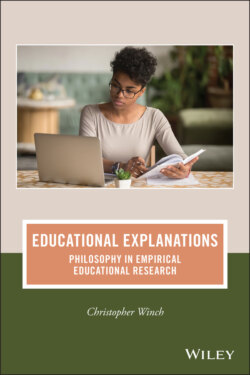Читать книгу Educational Explanations - Christopher Winch - Страница 35
Notes
Оглавление1 1 E.g. Barrow 1976; Carr, W. 2006.
2 2 Clark’s arguments are somewhat different and will be dealt with later in this chapter.
3 3 I have used the term ‘normative activities’ following Baker and Hacker to capture the practices which allow for application of terms like ‘correct’ and ‘incorrect’ to them. As many of these are informal and often fluid, the term ‘rule-governed’ with its connotations of something codified as an account of how they work, is slightly misleading.
4 4 A further complication is that there may be interlinguistic conceptual variation which is difficult to appreciate if the researcher has neither the linguistic resources nor the philosophical training to be aware of such nuances. See Chapters 9 and 10 for fuller treatment.
5 5 We will look in more detail in Chapter 4 at the criteria for good explanations, but we can be reasonably confident at this stage that they will not need to meet the standards set by Barrow in order to be viable.
6 6 By ‘theory’ I mean a body of supposed knowledge organised and connected, usually derived from systematic observation, description, analysis and evaluation. This is not an exhaustive account of what is meant by ‘theory’ but will do for the kinds of empirical theories with which we will primarily be concerned. See Winch, C. 2010, Ch. 6, pp. 111–113 for more on this.
7 7 If P can be explicated as (p and q and r…) and r is false then it follows that not-(p and q and r …) even though p, q and other propositional components of P might be true.
8 8 One might say that Popperian falsificationism takes this point to an extreme degree, if one maintains that the falsification of a single observation report deductively implies the falsehood of the hypothesis that generated the observation statement or even the laws underpinning the hypothesis. As we shall see, however, there are legitimate ways of blocking such drastic inferences.
9 9 We need to be much more careful when talking about probabilistic confirmation as for example Carnap (1962) and Salmon (1975) (both available in Achinstein ed. 1983a) have shown. It is possible for example that a research hypothesis h and an auxiliary hypothesis a be separately refuted and the conjunction handa be confirmed (Salmon 1975, p. 107ff.). Given that EER using quantitative techniques such as various forms of statistical inference is engaged in probabilistic confirmation and refutation, these paradoxes are potentially of huge importance (see Ch. 8).
10 10 It goes without saying that all points about contradictories and contraries apply to propositions as well as theories.
11 11 Two formally incompatible explanatory theories P and Q may be jointly false in C1. However, P may be true in C2. If this is so, since the truth of P entails the falsity of Q (they are incompatible in any context) then they are contradictories in C2. They have not become compatible through a change in context.
12 12 For examples of the latter, see both MacKay (2006) and Grant (2011).
13 13 There is much more on this topic in Chapter 8.
14 14 But such procedures carry no firm guarantees for the future – see Whitty (2006) cited in Clark 2006.
15 15 I here leave aside questions of what is meant by ‘teacher effectiveness’, a separate conceptual investigation that needs to be concluded before any study can begin.
16 16 Although RCTs most obviously have their home in causal explanations, they do not prove causality; they eliminate other candidate explanations. But the most likely explanation may be one which is either based on normative or motivational factors. See the discussion of Winch and Gingell (1994) in Chapter 7 of this book.
17 17 Another view, to be found, for example in Vico (1744) is what our reason tells us should be our guiding principles, a view sometimes known as ‘natural law’ which, in the Christian tradition, is based on the ‘Golden Rule’ or the ‘Law of God’ (see Hobbes 1651, esp Bk. III). Although of great interest, this is not of immediate relevance to this enquiry.
18 18 This is not an issue peculiar to education. There are plenty of other ‘social phenomena’ which participants would regard as a good: religious worship, the administration of justice, even the conduct of war. Clark’s injunction is applicable against any form of systematic social enquiry.
19 19 Bearing in mind that educational practices are preparatory to participating in a society with such values.
